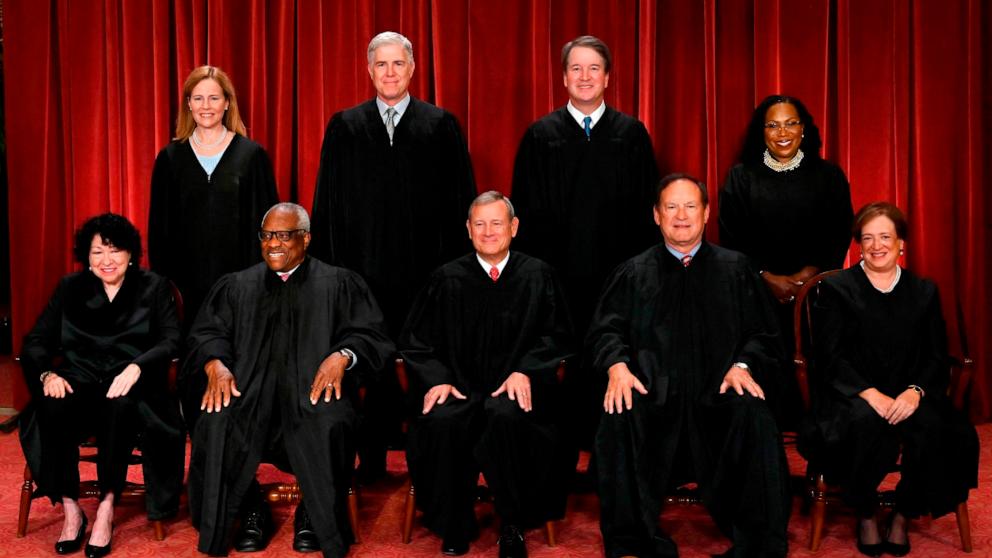Democrats demand ‘action’ against Supreme Court after Trump immunity ruling

The U.S. Supreme Court’s ruling granting the president immunity for official acts – which benefited Donald Trump in his trial on January 6 – has sparked renewed calls for impeachment or other “aggressive action” against conservative members of the court.
On the day the verdict was announced, New York State Democratic Representative Alexandria Ocasio-Cortez announced that she would file charges when Congress resumes next week, even though this would be politically unlikely.
“The Supreme Court is gripped by a corruption crisis beyond its control,” Ocasio-Cortez said in a social media post. However, she did not specify who she would target and has not yet responded to a request from ABC News for clarification. “Today’s ruling represents an attack on American democracy. It is up to Congress to protect our nation from this authoritarian capture.”
His Democratic colleague from New York, Representative Joe Morelle, said he would propose a constitutional amendment, a similarly unlikely undertaking.
“I will introduce a constitutional amendment to reverse the Supreme Court’s damaging decision and ensure that no president is above the law. This amendment will do what the Supreme Court failed to do – put our democracy first,” he wrote on X.
Meanwhile, Senate Democrats have long sought to hold the court more accountable following recent reports of justices accepting travel and other gifts, urging Justices Clarence Thomas and Samuel Alito to recuse themselves from the cases related to Jan. 6.
Court statement and reaction
The court said Trump was entitled to some immunity from criminal prosecution, including for actions to overturn the 2020 election results. However, it remanded the case back to the trial court to determine which charges could stand up—which “official acts” and which “unofficial acts” are not covered by immunity.
According to experts, this would delay a possible trial until after the elections in November.
In the court’s majority opinion, Chief Justice John Roberts wrote that a president’s motives are not relevant to determining whether an official act is covered by immunity or whether an act allegedly violated a generally applicable law.
Justice Sonia Sotomayor, in a strong dissenting opinion, said the ruling made the president a “king above the law.” It was a blow to the fundamental principles of the U.S. Constitution and the American system of government, which generally holds that “no one is above the law.”
The Democrats joined in the outrage.
House Minority Leader Hakeem Jeffries sharply criticized the decision and called for greater oversight and action on the highest court in the land. However, since Republicans control the House, Democrats are limited in what they can do.
“House Democrats will pursue aggressive oversight and legislative activity on the Supreme Court to ensure that the majority of far-right justices are brought into line with the Constitution,” Jeffries said in a statement.
Republicans hailed the presidential immunity decision as a victory, claiming the Biden administration had used the Justice Department as a weapon against Trump.
“The President of the United States must enjoy immunity, like members of Congress and federal judges. This is necessary for the proper functioning of any presidency,” Rep. Elise Stefanik said in a social media post.
In light of this growing criticism, we would like to take a closer look at some of the legislative options proposed by critics of the Supreme Court:
How would impeachment work?
According to the Administrative Office of the U.S. Courts, only Congress has the authority to remove a federal judge for “treason, bribery, or other high crimes and misdemeanors” through impeachment by the House of Representatives and trial and conviction by the Senate.
Article III of the Constitution adds that judges “shall hold their Office during good conduct.”
For the articles of impeachment to be passed, a simple majority (218 votes) is required in the House of Representatives.
Currently, Republicans hold 219 seats and Democrats 213.
If impeachment is approved, the articles of impeachment will be sent to the Senate, where a two-thirds majority – 67 votes – is required for conviction. The punishment for an impeached official after conviction is impeachment.
In the Senate, Democrats have 47 seats, Independents have 4 seats, and Republicans have 48.
Has a Supreme Court judge ever been impeached?
According to the Federal Judicial Center, only one Supreme Court justice has been impeached so far.
Associate Justice Samuel Chase was impeached by the U.S. House of Representatives in 1804 “for arbitrary and oppressive conduct of the case,” the report says. However, he was acquitted by the U.S. Senate in 1805 and remained a Supreme Court justice.
More than a dozen federal judges have been charged with, among other things, improper business dealings with litigants, abuse of power in contempt of court, drunken driving and other abuses of office.
Three of them resigned before the impeachment proceedings were completed. Only eight were convicted.
Supreme Court rocked by recent scandals
The Supreme Court has been the target of ethics concerns in recent years after investigative news outlet ProPublica alleged that Justices Clarence Thomas and Samuel Alito failed to disclose their ties to wealthy businessmen and political donors, and it was reported that Justice Sonia Sotomayor used taxpayer-funded court staff to sell her books.
Alito argued in a Wall Street Journal editorial that he acted appropriately. In Thomas’ case, he said he did not believe he needed to disclose those connections. In Sotomayor’s case, the court said she and the others were told to follow proper protocols.
Democratic Representative Rashida Tlaib called for the impeachment of Alito and Thomas in June in connection with the reports.
“We must act urgently to hold these crazed, corrupt extremists accountable,” Tlaib said in the House of Representatives in June. “It is deeply disturbing that the Supreme Court of the United States, the highest court in our land, is the only court that does not have an enforceable code of conduct.”
Justices Thomas, Alito, Sotomayor, Neil Gorsuch and John Roberts have also been criticized for financial or personal ties to companies and groups that litigate cases in the courts.
These scandals led to the introduction of the Democrat-backed Supreme Court Ethics, Recusal, and Transparency Act, which provides for greater oversight of judges and binds them to the same disclosure rules on gifts, travel and income as lower court judges.
The bill would also create a system to investigate complaints about their conduct and increase transparency regarding potential conflicts of interest with parties in court. The bill was first introduced in 2023.
“It is no wonder that the public trust is so badly damaged,” said Democratic Senator Jeff Merkley in a recent statement supporting the bill. “It is unacceptable that Supreme Court justices lack enforceable ethical guardrails, which encourages corruption.”
Some Republicans, however, say the proposed regulatory reform is an attempt to deprive the court of its legitimacy.
“This bill is not designed to strengthen the court or make it more ethical, but to destroy a conservative court,” Republican Senator Lindsey Graham said last year when he opposed the bill. “It is a bill designed to reshuffle the composition of the court.”
In April 2023, all nine judges issued a joint statement arguing that they already adhered to a code of “ethical principles and practices” and opposed independent oversight.
Devin Dwyer of ABC News contributed to this report.



